9th Amendment to the US Constitution
The 9th Amendment to the US Constitution is one of the least referred to amendments in decisions of the Supreme Court. It is also one of the most confusing, controversial and misunderstood amendments to the Constitution. This amendment reserves all rights not listed in the Constitution to the people. The 9th Amendment to the Constitution reads like this:
"The enumeration in the Constitution, of certain rights, shall not be construed to deny or disparage others retained by the people."
Purpose of the 9th Amendment
The 9th Amendment's purpose is clear. The Bill of Rights mentions certain rights that are to be protected from government interference, these rights include freedom of speech, freedom of religion, freedom of the press, freedom of assembly and the right to keep and bear arms, among others.
Just because a right is not mentioned in the Bill of Rights, though, does not mean that the government automatically has the right to interfere with it. Instead, the 9th Amendment says that any right not enumerated, or listed, in the Constitution is still retained by the people. So, in plain language, it means that there are other rights that people have that are not listed in the Constitution.
The Founding Fathers realized that they could not possibly list every natural right of human beings that needed protection. Instead, they delegated certain powers to the government that were specifically spelled out in the Constitution, and said everything else is left up to individuals and to their state governments.

What is a natural right? Natural rights are those rights that people have just because they are human. They are natural to mankind and should not be violated by the government. So, things like freedom of speech, freedom of religion and freedom from cruel and unusual punishment, were judged by the Founding Fathers, to be natural rights that the government can not violate.
You can read more about the Bill of Rights here.
9th Amendment Clauses
The first part of the 9th Amendment is called "The Enumeration of Rights Clause." It states that there are certain rights of the people, which are specifically listed, in the Constitution.
The second part of the 9th Amendment is called "The Rights Retained by the People Clause." This clause states that any rights that naturally belong to human beings, that are not specifically listed in the Constitution, are still protected rights. In other words, the government still cannot infringe on these rights, even though the Constitution doesn't say it can't. Those rights are still "retained" by the people.
History of the 9th Amendment
Why was the 9th Amendment added to the Bill of Rights? After the Constitution was written by the Constitutional Convention at Philadelphia in 1787 and submitted to the States for ratification, many voices arose saying the Constitution did not sufficiently protect the basic natural rights of the citizens.
The Anti-Federalist Party in particular claimed that unless certain rights were spelled out in a Bill of Rights, the government would easily take over these rights and abuse the people. Thomas Jefferson, Patrick Henry and George Mason were all of the Anti-Federalist opinion.
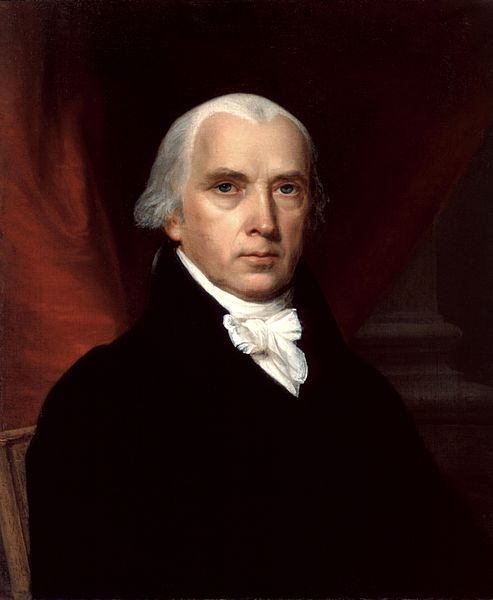 James Madison
James MadisonJames Madison
On the other hand, people in the Federalist Party, such as George Washington, John Adams, James Madison and Alexander Hamilton, believed that the Constitution did not give the government the right to do anything that was not specifically stated in it. Therefore, they reasoned, that a Bill of Rights was first of all unnecessary, but also possibly dangerous. Why? Because they thought that if specific rights were listed to be protected from government intrusion, it would imply that any other rights not listed, were under the power of the government.
James Madison was the primary author of the Constitution. He eventually decided to fight to see a Bill of Rights added, in spite of the fact that he didn't really think it necessary, in order to persuade enough people to join in ratifying the Constitution. On June 8, 1789, he presented to the First Congress, a list of suggested amendments to the Constitution. Referring to this debate about rights not specifically listed, he said this:
"It has been objected also against a Bill of Rights, that, by enumerating particular exceptions to the grant of power, it would disparage those rights which were not placed in that enumeration; and it might follow by implication, that those rights which were not singled out, were intended to be assigned into the hands of the General Government, and were consequently insecure. This is one of the most plausible arguments I have ever heard against the admission of a bill of rights into this system; but, I conceive, that it may be guarded against. I have attempted it, as gentlemen may see by turning to the last clause of the fourth resolution."
This passage comes from James Madison's June 8, 1789 speech to Congress, which presented his suggested amendments.
Madison's suggested amendment to solve the problem of the government taking powers that it was not intended to have was worded like this:
"The exceptions here or elsewhere in the constitution, made in favor of particular rights, shall not be so construed as to diminish the just importance of other rights retained by the people; or as to enlarge the powers delegated by the constitution; but either as actual limitations of such powers, or as inserted merely for greater caution."
Congress changed the wording slightly to the arrangement that we now know as the 9th Amendment. So, in the end, the Anti-Federalists won the argument and the Bill of Rights was added to the Constitution. You can read more about the History of the Bill of Rights here.
9th Amendment - The Problem
This is all pretty clear so far. So, where is the problem with the 9th Amendment? Why is it such a confusing and controversial amendment? The problem lies in this question, "Who determines what those rights are that are not listed in the Constitution that deserve protection from the government?"
Sometimes someone will claim something as their "right," and say that the government has no authority to regulate their right to do it. Some examples are the "right" to die and refuse medical treatment if you are sick, the "right" to have an abortion or the "right" to same sex marriage. In each of these cases, the federal or state governments have passed laws banning these things in most or in all cases. Did the government have the right to do this, or was the government violating the natural rights of people who want to do these things? The legislatures that made these laws were made up of the representatives of the people. So, clearly, the majority of people, viewed these things as wrong or dangerous behaviors and not as "rights."
In many cases, courts, including the Supreme Court, have ruled in cases involving these behaviors, and have thrown out the laws made by the people in their legislatures forbidding these behaviors - in clear violation of the 9th Amendment. The Courts have said, "Wait a minute. These things are protected rights and the government cannot interfere with people's right to do them." The Courts' rationale has been that the legislatures have no authority granted in the Constitution to make laws regarding these "rights" and the laws were therefore "unconstitutional." When the Courts throw out a law created a by an elected legislature, this is known as "judicial review." Judicial review simply means the Court examines the law to determine if the law itself is legal.
Judicial review itself is a very controversial practice. Who determines what is legal? The legislatures are supposed to create laws. Should they determine what "legal" is? Or should the Court be able to cancel the laws made by elected legislatures? Who does this process put into the place of the absolute authority, the people through their elected legislatures, or the the judges? Should unelected judges be put in the place where they can overrule the people's will? You can see why this is a controversial matter.
9th Amendment Interpretations
There are two basic views and interpretations of the 9th Amendment that are colliding here. One is that the Courts are supposed to protect people from the government violating a long list of unspecified rights. This is how the Court came up with the idea that the right to have an abortion is a protected right when it is not mentioned in the Constitution. Nowhere does the Constitution say something like "The government can not restrict people from having an abortion." Instead, the Courts have determined that this is an unmentioned right, which is therefore protected by the 9th Amendment.
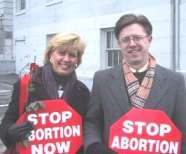
The opposing viewpoint is that while, yes, there are many rights not listed in the Constitution that are protected, it is not the job of the Courts to decide what those rights are. It is the people, through their legislatures, who are to determine what those rights are. So, according to this reasoning, if the people pass a law that says abortion is illegal, then it is not a right the people believe should be protected by the law. On the other hand, if the people do not pass a law saying that abortion is illegal, or if they pass a law saying specifically that abortion is, then the right to have an abortion would be protected by the law. The difference is in who is determining what the unlisted protected rights are - the people through their elected representative legislatures, or the Courts.
You can see why there is confusion and controversy over this issue. If the Courts can throw away laws made by the people, a few mostly unelected judges can rule over the majority of the population against their will. This goes directly against the purpose of the United States Constitution, which was to ensure a government "of the People, by the People and for the People," as Abraham Lincoln put it in his Gettysburg Address.
On the other hand, people who say that these things, such as the "right" to die, abortion and gay marriage, are also natural rights that are not listed in the Constitution, believe that the majority of the people, through their legislatures, are unjustly and unconstitutionally violating their rights to do these things when they pass laws against them and that it is the Courts' job to protect these rights.
The purpose of this article is not to take a side on the issues. The purpose is to point out the differing viewpoints and the central issue of the problem, which is, who should have the authority to determine which rights are protected and which are not - the people or the judges.
9th Amendment -
Why the confusion?
This confusion did not always exist in American history. For the first 100+ years of the United States, the Courts never, not one single time, claimed that they had the right to determine whether or not a specific thing not mentioned as a right in the Constitution was actually protected. Likewise the Courts for their first 100+ years never cast out a law passed by a legislature as unconstitutional based on the idea that it was violating an unlisted right.
Why was this? The answer lies in the fact that the Bill of Rights only lists rights that are not to be violated by the Federal government, not the state governments. The Opening Phrase of the 1st Amendment says, "Congress shall make no law regarding..." the forthcoming rights, such as freedom of speech, freedom of religion and freedom of the press. It doesn't say anything about the states not being allowed to do these things. The reason for this is that the government of the United States was designed as a two part system where the federal government had certain powers that were specifically listed in the Constitution. All other powers not given to the Federal government, were left to the states.
For example, Article 1, Section 1 of the US Constitution says:
"All legislative Powers herein granted shall be vested in a Congress of the United States..."
Notice that the Congress only has the powers that are granted to it in the Constitution. The Congress cannot just pick anything it wants to and make laws about it. That power has to be granted in the Constitution.
Likewise, the 10th Amendment to the Constitution says:
"The powers not delegated to the United States by the Constitution, nor prohibited by it to the States, are reserved to the States respectively, or to the people."
Notice that passage also specifically states that unless a power is granted to the federal government, it is reserved to the State governments and the people. James Madison made this point about the powers not delegated to the federal government being retained by the States in The Federalist, No. 45:
"The powers delegated by the proposed Constitution to the federal government are few and defined. Those which are to remain in the State governments are numerous and indefinite. The former will be exercised principally on external objects, as war, peace, negotiation, and foreign commerce;... The powers reserved to the several States will extend to all the objects which, in the ordinary course of affairs, concern the lives, liberties, and properties of the people, and the internal order, improvement, and prosperity of the State."
Likewise, Chief Justice John Marshall said very clearly in a case called Barron vs. Baltimore, 1833, that the Bill of Rights...
"...demanded security against the apprehended encroachments of the [federal] government - not against those of the [state] governments... These amendments contain no expression indicating an intention to apply them to the state governments. This Court cannot so apply them."
So, originally, the States could regulate such things as speech, religion, the press, etc. Wouldn't this create a situation where the states could violate basic natural rights? Yes, it could, but the Founders believed it would not be likely, because the people would be directly responsible for electing their own representatives in their state legislatures. After the Revolutionary War, tyranny from a powerful federal government was more to be feared than tyranny in the local governments. The simplest reason is that the local government is close to the people, whereas the federal government is far away. Because the people are so close to the local government, they can more easily control it, than they can the federal government, which is far away.

The fact that the powers not delegated to the Federal government are reserved by the State governments, has specific application to the interpretation of the 9th Amendment. Who determines which unlisted rights are to be protected by the government? According to the 10th Amendment and Article 1, Section 1 of the Constitution, this power is reserved to the States, not to the Courts. There is nowhere in the Constitution that says the Courts have the power to determine which rights not listed are to be protected. The Constitution does say that powers not given to the federal government are given to the States and since the power to determine which unlisted rights are to be protected is nowhere delegated to the Federal government, this right is therefore given to the States. This is the view that was held by the Courts and by the majority of the population until recent times. Alexander Hamilton wrote, in The Federalist, No. 81, that:
"There is not a syllable in the plan [the Constitution] which directly empowers the national courts to construe the laws according to the spirit of the Constitution."
What he is saying here is that the Courts are not empowered to enforce ideas that are not directly stated in the Constitution. When the Courts say today that a "right" such as the "right" to abortion or gay marriage are protected rights, they are reaching outside of the Constitution into their own ideas of what is right and wrong, rather than by abiding by the laws passed by the people - an obvious and clear usurpation of the right of the people to determine their own laws.
9th Amendment -
Changes in Interpretation
What happened, when did the tide shift from the obvious language of the 9th Amendment, which gives the people, through their State legislatures, the right to make their own laws and determine which behaviors will be allowed and which should be illegal, to the opposing opinion, that the Courts should decide which behaviors are "rights" and which are not?
The answer lies primarily in two events. The first is the addition of the 14th Amendment to the Constitution and its interpretation by the Courts. The second is a change of thinking that came about in a Supreme Court decision called Griswold vs. Connecticut in 1965.
9th Amendment Changes after the 14th Amendment
After the Civil War, many southern states began to pass laws that were inherently unfair toward the new black citizens. Black citizens were receiving very different and unequal treatment than white citizens. Southern states began to pass discriminatory laws against former slaves, known as "Black Codes" or "Jim Crow" laws. The phrase "Jim Crow" laws probably came from a song, "Jump Jim Crow," that made fun of black people, which became popular around the mid-1800s. You can read an informative article about the song Jump Jim Crow here.
In response to these unfair Jim Crow laws, Congress passed the 14th Amendment to the US Constitution. Section 1 of this Amendment dealt with the Jim Crow laws. It reads like this:
"All persons born or naturalized in the United States and subject to the jurisdiction thereof, are citizens of the United States and of the State wherein they reside. No State shall make or enforce any law which shall abridge the privileges or immunities of citizens of the United States; nor shall any State deprive any person of life, liberty, or property, without due process of law; nor deny to any person within its jurisdiction the equal protection of the laws."
You can read the entire 14th Amendment here.
The part in red above is the specific part of the 14th Amendment that has been used by the Courts to take powers away from the States and put it into their own hands in direct violation of the 9th Amendment. Notice that the passage says "No State... shall make... any law which shall abridge the privileges... of citizens of the United States. Nor shall any State deprive any person of life, liberty, or property, without due process of law." This is also called the "Due Process Clause."
The Congress was clearly trying to protect black people from unfair treatment, but the Courts began to rule that this part of the 14th Amendment meant that the States could not make any laws violating the "rights" of the people and the Courts began to say what those rights should be. Remember that before this, the people, through their elected legislatures, could determine which behaviors were protected rights and which were illegal. Now, the Courts said the people could not do this anymore through their legislatures. Instead, it was the job of the Court. The reasoning is sort of convoluted, but nonetheless, that is what happened. The Court completely abandoned the clear wording of the 9th Amendment by adopting this position.
9th Amendment Changes with Griswold vs. Connecticut
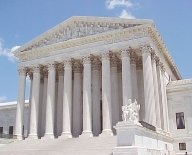
the United States
The next important change regarding who determines which behaviors are unlisted rights to be guaranteed protection, the people through their legislatures, or the Courts, was a case called Griswold vs. Connecticut, 1965.
In Griswold, the Supreme Court "found" a new right in the Constitution that had never been found there before, a "right to privacy." The case centered around a Connecticut law that banned the use and sale of any kind of contraceptives. The law was created in 1879 and had been on the books ever since, though it was little enforced. A few cases had been brought against this law before, but none had been decided by the Supreme Court.
In the case, a woman named Estelle Griswold, who was then the director of the Planned Parenthood League of Connecticut, and Dr. C. Lee Buxton, who was a doctor and a professor at the Yale School of Medicine, opened an abortion facility in New Haven Connecticut specifically to test this law, which they viewed as unconstitutionally violating a woman's "right" to have an abortion.
Shortly after opening the facility, they were arrested and fined. They appealed this decision, which they lost at both the district level and before the Connecticut Supreme Court. Next they appealed to the Supreme Court which decided in their favor and agreed that the law was unconstitutional.
9th Amendment -
The New Found "Right to Privacy"
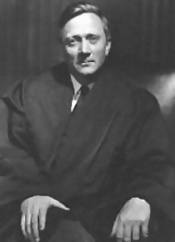
The Court created a new rationale which had never been heard of before. Justice William O. Douglas, writing the majority decision, ruled that there is a right to privacy to be found in the Constitution. Where is it, one may ask? Justice Douglas wrote that "specific guarantees in the Bill of Rights have penumbras, formed by emanations from those guarantees that help give them life and substance."
A penumbra is basically a dim, vague and undefined shadow. What Justice Douglas meant by this very weird (everyone agrees) statement is that the specific rights mentioned in the Constitution that are protected have a series of vague and undefined rights surrounding them that are somehow relative to them. He was basically saying that the Court could look into these shadows and undefined zones around these rights and find more rights that were to be protected.
So, for example, the First Amendment right to freedom of assembly (or association) could be said to imply that there is a right to privacy in one's associations, even though the First Amendment doesn't say this specifically. Likewise, the Third Amendment, which restricts specific military intrusions into one's home, could be said to imply that there is a right of privacy in one's home and the Fourth Amendment, which forbids searches and seizures of one's home and private papers without a very specific search warrant, could be said to imply that there is a right of privacy surrounding these things, again, even though these amendments do not say this directly.
The problem is that the Court has decided that it alone has the right to look into these shadows and determine what these "extra rights" are. The rights to an abortion or gay marriage are examples of rights the Court has created, when the people of the states have, in most cases, said that these things are not rights to be protected. Can you see how the Courts have taken the power away from the people and nullified the 9th Amendment?
Justice Arthur Goldberg defended the Supreme Court's ruling in Griswold with a concurring opinion which referred to the 9th Amendment, in which he said that the 9th Amendment precluded Connecticut from invading the right of citizens to privacy in their choice to use contraceptives. Justice John Marshall Harlan II wrote another concurring opinion in which he argued that the right to privacy is protected by the 14th Amendment's Due Process Clause, as stated above.
It should be noted that the very weird (everyone agrees) 9th Amendment "penumbra" argument is not used by the Courts anymore. Instead, any time the Court wants to make up a new unlisted right or make its own will law, against the wishes of the people, it now relies exclusively on the 14th Amendment Due Process Clause argument.
9th Amendment -
Overriding the Will of the People
Someone may say that it is reasonable to have a right of privacy which is protected from government intrusions. While this may be true, the Founders intended that the people determine these rights and protect them with laws passed by their representative legislatures. That's why they included the 9th Amendment in the Bill of Rights. Instead, the Courts have said what the rights are, in direct opposition to the will of the people. Do you see the problem?
If people want a right to privacy, the Founders wanted the people to pass laws to protect this right. They did not intend for a small handful of unelected judges to determine this right. If the Courts have this right, what happens when they decide something that you and all of your friends want to do is not a right? Then, you would have no way to protest and pass laws that would protect your right - the Court would take that right away from you.
For example, if you and the majority of people think it is your right to go to the beach, but the Court says it is not your right to go to the beach, you would have no way to guarantee your right to go to the beach by passing laws to protect this right. The Court would override the will of the majority. Should the Court have the right to override the will of the majority?
9th Amendment -
Roe vs. Wade

This is exactly what happened in the Roe vs. Wade, 1973, abortion decision which made all state laws banning abortions illegal. The people of Texas had passed a law banning abortions. They believed that having an abortion should not be a protected right. The Supreme Court said otherwise, ignoring the 9th Amendment, and declared the law unconstitutional. So, a handful of judges defiantly overruled the vote of the people of Texas, and other states that also had anti-abortion rules.
Whether or not you agree that abortion is an appropriate choice for a woman to make, most people would agree that having a small group of unelected judges throw out the will of the people violates the very principles of freedom and liberty that the Founders fought for in the Revolutionary War and tried to protect in the Constitution.
Another case in which the Supreme Court overruled the will of the people of Texas was called Lawrence vs. Texas, 2003. In this case, the people of Texas had passed a law making certain types of sexual contact between people of the same sex illegal. The Supreme Court ruled this law unconstitutional, saying that people had a right to privacy in their consensual adult sexual relations, no matter what sex they were. The majority opinion, written by Justice Anthony Kennedy, relied on the 14th Amendment Due Process Clause argument, that there is an equal right to privacy in one's sexual relations, no matter what sex the partners happen to be.
9th Amendment -
The Solution to the Problem
So what is the solution to this problem of judges taking away the right of the people to determine their own laws? The answer is in having judges appointed who agree that it is the right of the people to make these decisions. There are many judges who disagree that the Courts' should determine which unlisted rights are to be protected. It is the responsibility of the people to elect legislators, governors and presidents who will elect judges with this viewpoint.
These judges are generally called "originalists" or "strict constructionists" because they believe the original construction of the Constitution was that the people retain the right through their State legislatures to make these decisions. Judges on the opposite side, who believe the Courts can determine which unlisted rights are to be protected, are often called "judicial activists," which implies they are making laws in place of the legislatures. For a more in depth discussion of the meanings of the terms originalists, strict constructionists and judicial activists, please click here.
Find out what your elected officials believe about the proper role of judges and remove those who believe judges should overrule the will of the people. Vote for officials who will appoint judges who will not throw out the will of the people.
Amendments:
Preamble to the Bill of Rights
Learn about the 1st Amendment here.
Learn about the 2nd Amendment here.
Learn about the 3rd Amendment here.
Learn about the 4th Amendment here.
Learn about the 5th Amendment here.
Learn about the 6th Amendment here.
Learn about the 7th Amendment here.
Learn about the 8th Amendment here.
Learn about the 9th Amendment here.
Learn about the 10th Amendment here.
- Main Bill of Rights page.
- For a brief synopsis of the First Ten Amendments, click here.
- Learn about the Purpose of the Bill of Rights here.
- Read about the History of the Bill of Rights here.
- Look at the Bill of Rights in Pictures here.
Last updated 8/10/12
Return to top of 9th Amendment
Revolutionary War and Beyond Home
Like This Page?
© 2008 - 2022 Revolutionary-War-and-Beyond.com Dan & Jax Bubis

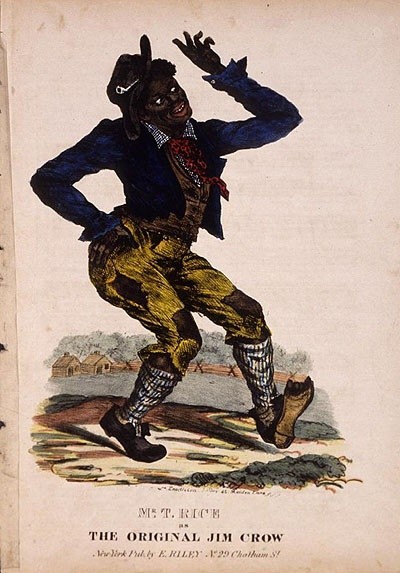









Facebook Comments